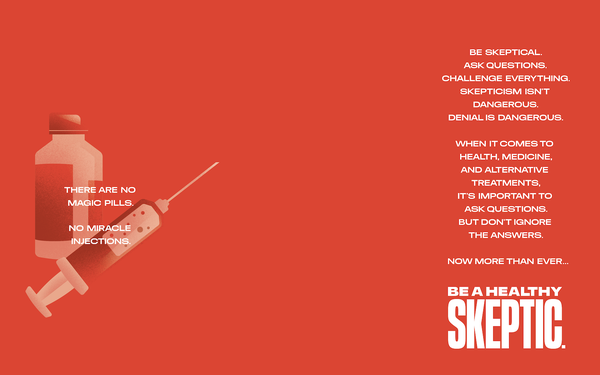
Defending big pharma
against compounded weight-loss drugs as well as alternative medicine, Eli Lilly today launched “Be A Healthy Skeptic” with a full-page print ad in The Wall Street Journal. It will
also run in Sunday’s edition of The New York Times.
The all-text, white-on-red full-page ad lauds skepticism as part of the process that results in peer-reviewed safe and
effective medicine, but derides today’s “unapproved products that claim to be alternatives to traditional medicines” which it says “are making big claims with little evidence
or oversight.”
“Now more than ever before anything goes into your body be skeptical of what’s in it, be skeptical of where it comes from, be skeptical of who oversees its
production.”
advertisement
advertisement
The print campaign will continue next week with ads in the Los Angeles Times, Hollywood Reporter and People. These ads include one that shows a
syringe with the text “no miracle injections,” another showing a bottle and the words “there are no magic pills.”
“Be a Healthy Skeptic” also includes a :30 spot running on paid social media, also starting Sunday. This ad takes aim at those friends, relatives and podcasters who tell viewers to
“trust me, bro” through such phrases as “I know just the thing,” “it’s all natural,” and“you don’t need a prescription.”
Real
medicine, on the other hand, “doesn’t need your faith,” the spot continues. Neither do tested and approved medicines.
The “Be a Healthy Skeptic” campaign, Lilly
tells Marketing Daily, was previewed by a billboard that ran in Los Angeles last week.
Created in collaboration with Wieden+Kennedy, the campaign is targeting “a broad consumer
audience,” the company says, hoping to encourage people “to be skeptical of advertising that claims these untested, unapproved products are proven to be safe and effective.”
Lilly says that the product claims that it’s now campaigning against “prey on people’s insecurities and blur the lines between fact and fiction.”
“Be a Healthy
Skeptic,” comes on the heels of Hims & Hers’ recent Super Bowl
commercial which stirred controversy by stating that its compounded GLP-1 weight loss medications are “affordable,” and “doctor trusted” while big pharma’s are
“priced for profits, not patients.”
Meanwhile, marketers of alternative medicines are hoping that Robert F Kennedy Jr.’s ascension to top US. health officer will result in
greater regulatory support for their products.
“We chose the word “skepticism” because…skepticism is essential to making medicine,” Lilly says. Questioning
whether something actually works is how we get to repeatable, peer-reviewed proof that a medicine is safe and effective.”
In addition to the “Be a Healthy
Skeptic” campaign, Lilly’s work in this area in includes an educational website on how consumers can “protect yourself
against counterfeit, fake, and unsafe or untested compounded products.”